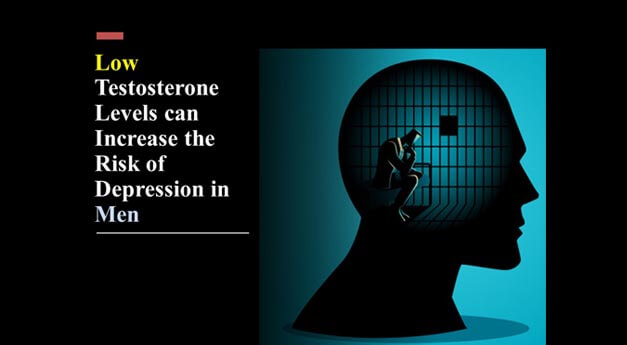Understanding the Link Between Low Testosterone and Depression
In men’s health, low testosterone (commonly known as Low T) is more than just a hormonal imbalance. It can significantly impact mental well-being, particularly by contributing to clinical depression and mood disorders. Testosterone, the primary male sex hormone, plays a critical role not just in sexual health and physical strength, but also in cognitive function, emotional stability, and overall quality of life.
When testosterone levels fall below the healthy range, men may experience a range of psychological symptoms, including persistent sadness, irritability, low self-esteem, chronic fatigue, and loss of interest in activities once enjoyed. These are not merely emotional issues — they are often biochemical consequences of hormonal deficiencies.
What Is Low Testosterone?
Low testosterone is defined medically as a total testosterone level below 300 ng/dL, according to the American Urological Association. While aging is the most common cause, other factors like obesity, chronic illness, diabetes, injury to the testicles, and even stress can contribute to the decline of this vital hormone.
Symptoms of Low Testosterone
-
Decreased libido
-
Erectile dysfunction
-
Reduced muscle mass
-
Increased body fat
-
Mood disturbances
-
Sleep disturbances
-
Difficulty concentrating
-
Depression and anxiety
These symptoms, especially when clustered together, form a diagnostic red flag that testosterone testing is warranted.
The Biochemistry Behind Depression and Testosterone
Testosterone exerts neuroprotective effects. It enhances the production of key neurotransmitters such as dopamine and serotonin, which are essential for mood regulation. A drop in testosterone can disrupt these neurochemical pathways, leading to increased vulnerability to depression.
Moreover, low testosterone is linked to increased levels of cortisol, the stress hormone. Elevated cortisol not only suppresses testosterone further but also worsens mental health outcomes, creating a vicious cycle of hormonal and emotional dysregulation.
Scientific Evidence Supporting the Link
Numerous clinical studies have shown a direct correlation between low testosterone and increased incidence of depression in men:
-
A study published in the Archives of General Psychiatry found that men with lower testosterone levels were four times more likely to be diagnosed with clinical depression.
-
The Journal of Clinical Endocrinology & Metabolism reported that testosterone replacement therapy (TRT) significantly improved mood and reduced depressive symptoms in men with hypogonadism.
-
Longitudinal studies have also shown that men with consistently low testosterone are more likely to report low life satisfaction and poor emotional resilience.
Diagnosing Low Testosterone
Diagnosis begins with a comprehensive health evaluation, including:
-
Symptom assessment through validated questionnaires such as ADAM (Androgen Deficiency in Aging Males)
-
Morning blood tests to determine free and total testosterone levels
-
Additional hormone panels, including luteinizing hormone (LH), follicle-stimulating hormone (FSH), and sex hormone-binding globulin (SHBG)
If low testosterone is confirmed, healthcare providers often assess mental health concurrently, recognizing the bidirectional impact of hormone imbalance and emotional wellbeing.
Depression Symptoms in Men with Low T
While depression affects individuals differently, men with low testosterone may present uniquely, often masking classic depressive symptoms with other behaviors:
-
Increased irritability and anger outbursts
-
Social withdrawal
-
Lack of motivation
-
Risk-taking or impulsive behavior
-
Substance abuse as a coping mechanism
These signs often go unnoticed or are attributed to external stressors, delaying crucial treatment.
Testosterone Replacement Therapy (TRT) and Mental Health
TRT is a clinically proven intervention for men with documented testosterone deficiency. Its benefits extend beyond physical rejuvenation and include significant improvements in emotional well-being, energy levels, libido, and cognitive clarity.
Common Forms of TRT:
-
Injectable testosterone (cypionate or enanthate)
-
Topical gels and creams
-
Testosterone pellets inserted subcutaneously
-
Buccal tablets and nasal sprays
TRT must be medically supervised to prevent side effects like erythrocytosis, sleep apnea exacerbation, or prostate-related issues. Monitoring includes regular blood tests and clinical evaluations.
Natural Ways to Boost Testosterone and Mood
While TRT is effective, some men prefer or supplement with lifestyle-based strategies:
1. Exercise Regularly
High-intensity interval training (HIIT) and resistance training can naturally stimulate testosterone production and release endorphins, improving mood.
2. Improve Sleep Quality
Testosterone is produced primarily during deep sleep stages. Aim for 7-9 hours of uninterrupted sleep to support hormonal balance.
3. Optimize Nutrition
Include zinc, vitamin D, magnesium, and healthy fats in your diet to support testosterone synthesis.
4. Reduce Stress
Chronic stress elevates cortisol, which suppresses testosterone. Practices like mindfulness, yoga, and deep breathing are powerful tools for emotional stability.
5. Limit Alcohol and Avoid Smoking
Both can reduce testosterone and interfere with mental health over time.
When to Seek Help
If you’re experiencing symptoms like persistent sadness, unexplained fatigue, or loss of interest, it’s crucial to speak with a qualified healthcare provider. A full evaluation can determine whether low testosterone is a contributing factor.
Mental health matters — and treating testosterone deficiency may be a key step toward emotional recovery and reclaiming your vitality.
Final Thoughts: Empowering Men’s Health Holistically
Low testosterone and depression are interlinked conditions that deserve comprehensive, individualized care. By addressing both the hormonal and psychological components, men can experience profound improvements in quality of life, relationship satisfaction, and overall vitality.
At the core, understanding your body is the first step to healing. Regular check-ups, open discussions with healthcare providers, and a proactive approach to wellness can transform lives.






